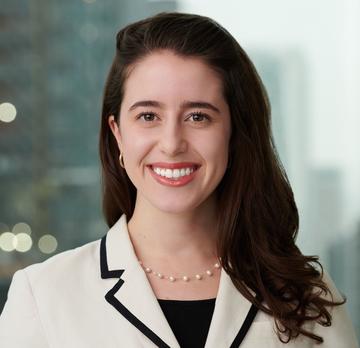Meagan Loyst, founder and CEO of Gen Z VCs

Meagan Loyst is the founder and CEO of Gen Z VCs, a global community for Gen Z investors, founders, and operators with more than 27,000 members from 80 countries. Meagan is a trained investor with expertise in technology and consumer trends and was hired as the youngest investor at General Atlantic and Lerer Hippeau. Aside from being a full-time entrepreneur, she has multiple hats. She is a social media content creator with around 77,000 followers on Instagram, 52,000 followers on LinkedIn, 44,000 on Twitter, and 21,000 on TikTok (as of January 2024). She also leads consulting projects with Fortune 500 companies, funds, startups, and beyond. Meagan was on the Forbes 30 Under 30 in 2022 and has appeared in major media outlets, including the Financial Times, Bloomberg, and The Washington Post. She is currently a full-time MBA student at the University of Oxford, loving her life at Brasenose College.
I worked for General Atlantic right out of college, mostly sourcing and investing in pre-IPO technology companies. Then I moved to an early-stage fund called Lerer Hippeau, a VC fund with $1.5 billion under management, covering everything from technology to consumer to healthcare. This was during the middle of the pandemic, and I was the youngest person on my team. I didn't have any peers or a network, so I started writing and creating content as a side hustle. I tweeted, “Hey, are any Gen Z investors out there investing in Gen Z companies?” That led to 71 interviews with other Gen Z investors all over the world. It was the first time I ever had internet friends. Then, I wrote an article about it and it went viral. After the article was published, I started a Slack group to connect us all, and the number of people in the community grew from 30 to 1000 in 4 days via word of mouth. Now fast forward, we have over 27,000 members in the community from 80 countries, and it’s grown into a larger global movement empowering young people to break into VC and entrepreneurship.

Entrepreneurship is taking charge of your own destiny and your career. You become the sole driver, and your path is no longer decided by a manager telling you how you move up or how you grow. I equate it to limitless potential. When you're able to chart your destiny and go after and solve the biggest problems that you see in the world, it’s up to you to figure out how to solve them.
You need to be good at selling/storytelling, be tenacious, and be scrappy. If you want to raise money, you have to sell yourself and your company through storytelling, especially early on when the risk is higher. Through selling/storytelling, you convince people to join your team. You also have to be creative with how you’re building your brand and solving problems. All of them go hand in hand.
Girls Who Invest
In my freshman year of college, I joined Girls Who Invest, a non-profit organization with a goal to have 30% of the world's assets managed by women by 2030. They help young women break into the investment industry because the number of women in asset management is very low. They were such a big driver in helping me build my network in college, landing my first investment job at General Atlantic (a GWI Partner), and setting me up for success in the job with training and education. I launched their mentorship program, started their alumni council, and now I'm on their advisory board.
Allie Miller…and Taylor Swift!
I love people who pursue their passions and make their careers out of the things that they love. One of my inspirations is Allie Miller, who is a good friend of mine. She is an AI advocate, investor, and content creator with a business mind, and has over a million followers on Linkedin. She brings such good insights into the world of AI, which tends to be male-dominated. And I love Taylor Swift, for obvious reasons!
Gen Z VCs has partnered with financial sponsors for events. This summer, we held eight events in eight countries across Europe with more than 700 attendees – it was covered by Sifted, “What’s hot — and what’s not — for Europe’s Gen Z VCs?”. We partnered with funds, which provided their offices, food, and drinks. We work with partners in the VC ecosystem who believe in our vision, and they love to support the next generation of the startup ecosystem. As a result, we've built an army of supporters, both in terms of young investors, founders, and students, as well as heavy hitters at big funds and the broader tech ecosystem. We’ve worked with partners like Mercury, Hubspot, Citizens Bank, and others as well in 2023.
At the same time, a lot of things are broken in VC from a systemic lens and I’m here at Oxford to look into different VC fund models. Take the incentive structures for example; the average and medium carry for analysts and associates is 0%. If I could design a fund from scratch that feels more equitable and gives young people an opportunity to build wealth — what would that look like? That’s what I’m trying to figure out over the course of my time here. I want to see how that model evolves into a path that creates opportunity for people who currently don't have financial access, helping the next generation build wealth through investing.
When I joined my junior year summer internship at General Atlantic, I was the only woman in my summer analyst class of 6. For the full-time job, I was the first person hired from a non-Ivy League school in the analysts program's history – Girls Who Invest advocated for me to get my resume/cover letter in front of them (again, evidence of why communities are so important). Otherwise, these funds wouldn’t have historically looked at someone like me simply because I didn't go to Harvard, Stanford, or an Ivy. Luckily, this is changing for the better & many of these firms have expanded their recruiting efforts in a big way. More of my friends in VC are women or people of color, which likely wasn’t the case even 10 years ago. Organizations, such as Gen Z VCs, All Raise, Girls Who Invest, and BLCK VC are putting in the work to make sure that young people with all different backgrounds are getting exposure, and funneling them into firms.
In VC, there's still a hiring bias that sees credentialing in a traditional way, although people are starting to recognize the importance of diversity (in thought, background, etc.). Very few VC funds hire college graduates right out of school. People think investment banking is competitive, but it’s even crazier if you want to go straight into investing out of college. In VC, recruiting is crazy, because there are only five or six spots at the major funds that DO recruit out of college (if that), which is already a small list of 3-10 firms.
That’s why representation matters. It's important to see yourself in the people you see on stage & in the spotlight. The All Raise conference was the first time I thought to myself, “I want to be a woman in VC” after seeing Emily Weiss, the founder of Glossier, talk on stage about working with famed VC Kirsten Green, Managing Partner and Founder of Forerunner Ventures. Now, I’m serving that role for young women who want to break into VC, become a solopreneur, build community, and beyond. It’s very full circle. For example, I was the youngest keynote speaker (at 26) for Slush, the world’s largest startup conference. I used to be afraid of public speaking, but now I do it for a living. I think of the people in the audience who may be in a similar position to me or where I was when I was in college, just graduating, etc. You’re able to show what’s possible, and that age doesn’t define you – my keynote in 2023 was called “Age (Of VCs & Founders) Is Just a Number.”
Find a community! And if you can't find a community, build your own community. Gen Z VCs started exactly this way – looking for other young people working in VC who recently started their jobs, were struggling with scaling up in their role during the pandemic, and were in need of VC friends! I ended up speaking with 71 other young investors I met on Twitter, with the number one question they asked being, “Who else are you meeting? I also started my job, and I don’t have any friends.“ At the time, I knew all 71 people, but they didn't know each other – so I connected us all on a Zoom call! And they had such a great experience that they also told and invited their friends. That's how we went viral — it stemmed from the need for real relationships and friendships. I think no matter what stage you’re at in your life, you need that. Think about not only what you bring to the table, but how you can bring people together around a common interest or mission so you can all grow together.
It's so simple: don't be discouraged. Melanie Perkins, the founder of Canva, said she got around 100 rejections before she got “the yes.” That’s because the right people didn't see the vision. It takes persistence and a positive attitude to bring something into the world. It's not always going to be an immediate yes. But don't let anyone tell you that you can't do something because you don't have the right background. That is something that a lot of younger entrepreneurs in particular face. People might ask “Why are you the best person building it?” because you might not have to have years of experience to show for it; however, you can bring in other elements that play into that equation. If anything, use your networks as fuel for the fire to keep building and prove everyone wrong.



